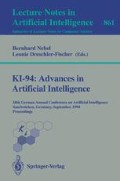Abstract
We present a Preferential Default Description Logic (pddl) based on weighted defaults and show that the preferential entailment relation

∑ satisfies all properties of system P and Rational Monotonicity. The main characteristics of this pddl is that it uses an ordering between multisets of defaults for priorization, treats defaults similar to material implications, and adheres strictly to the principle of exception minimization.
We furthermore show how maximization of default applications can be consistently combined with

∑ without violating exception minimization. Furthermore, the resulting entailment relation

F ∑ still satisfies all properties of system P.
We then develop a proof theory for

∑ based on default spaces, which shows that

∑ is decidable if the underlying dl is.

∑ can be syntactically characterized by strict entailment from all maximal default spaces and can thus be computed by an exponential algorithm.
The project KIT-VM11 is supported by the German Federal Minister of Research and Technology (BMFT) under contract 01 IV 101Q8.
Preview
Unable to display preview. Download preview PDF.
References
F. Baader, B. Hollunder, “Embedding Defaults into Terminological Knowledge Representation Formalisms”, KR-92, 306–317
F. Baader, B. Hollunder, “How to Prefer More Specific Defaults in Terminological Default Logic”, IJCAI-93, 669–674
G. Brewka, Nonmonotonic Reasoning: Logical Foundations of Commonsense, Cambridge: Cambridge University Press, 1991
F.M. Donini, M. Lenzerini, D. Nardi, W. Nutt, “Tractable Concept Languages” IJCAI-91, 458–463
F.M. Donini, M. Lenzerini, D. Nardi, A. Schaerf, W. Nutt, “Adding Epistemic Operators to Concept Languages”, KR-92, 342–353
J. Goldsmith, J. Pearl, “System-Z +: A Formalism for Reasoning with Variable-Strength Defaults”, AAAI-91, 399–404
S. Kraus, D. Lehman, M. Magidor, “Nonmonotonic Reasoning, Preferential Models and Cumulative Logics”, Artificial Intelligence 44, 167–207, 1990
V. Lifschitz, “Computing Circumscription”, IJCAI-85, 121–127
D. Makinson, “General Patterns in Nonmonotonic Reasoning”, in D. Gabbay, C. Hogger, J. Robinson (eds), Handbook of Logic in Artificial Intelligence, Oxford: Oxford University Press, in print
J. McCarthy, “Circumscription—A Form of Non-Monotonic Reasoning”, Artificial Intelligence 13, 1980
G. Pinkas, “Prepositional Non-Monotonic Reasoning and Inconsistency in Symmetric Neural Networks”, IJCAI-91, 525–530
J.J. Quantz, “Interpretation as Exception Minimization”, IJCAI-93, 1310–1315
J.J. Quantz, V. Royer, “A Preference Semantics for Defaults in Terminological Logics”, KR-92, 294–305
J.J. Quantz, M. Ryan, Preferential Default Description Logics, KIT-Report 110, Technische Universität Berlin, 1993
J.J. Quantz, B. Schmitz, “Knowledge-Based Disambiguation for Machine Translation”, Minds and Machines 4, 39–57, 1994
R. Reiter, “A Logic for Default Reasoning”, Artificial Intelligence 13, 1980
M. Ryan, “Representing Defaults as Sentences with Reduced Priority”, KR-92, 649–660
Y. Shoham, Reasoning about Change: Time and Causation from the Standpoint of Artificial Intelligence, Cambridge: MIT Press, 1988
S. Suska, A Proof Theory for Preferential Default Description Logics, KIT Report in Preparation
Author information
Authors and Affiliations
Editor information
Rights and permissions
Copyright information
© 1994 Springer-Verlag Berlin Heidelberg
About this paper
Cite this paper
Quantz, J.J., Suska, S. (1994). Weighted defaults in description logics: Formal properties and proof theory. In: Nebel, B., Dreschler-Fischer, L. (eds) KI-94: Advances in Artificial Intelligence. KI 1994. Lecture Notes in Computer Science, vol 861. Springer, Berlin, Heidelberg. https://doi.org/10.1007/3-540-58467-6_16
Download citation
DOI: https://doi.org/10.1007/3-540-58467-6_16
Published:
Publisher Name: Springer, Berlin, Heidelberg
Print ISBN: 978-3-540-58467-4
Online ISBN: 978-3-540-48979-5
eBook Packages: Springer Book Archive

